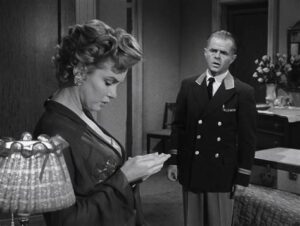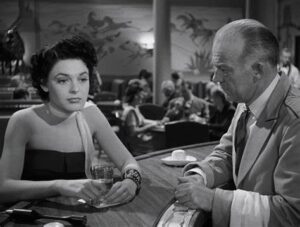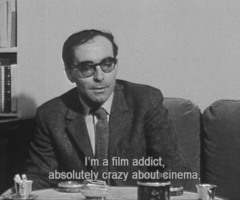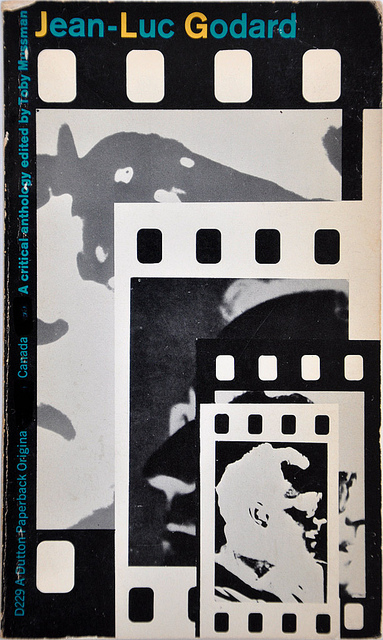From the March 25, 2005 Chicago Reader.
 Unusually seedy and small-scale for a Fox picture of 1952, this black-and-white thriller is set over one evening exclusively inside a middle-class urban hotel and the adjoining bar. The bar’s singer (Anne Bancroft in her screen debut) breaks up with her sour pilot boyfriend (Richard Widmark), a hotel guest. He responds by flirting with a woman (Marilyn Monroe) in another room who’s babysitting a little girl (Donna Corcoran), but the babysitter turns out to be psychotic and potentially dangerous. Daniel Taradash’s script is contrived in spots, and the main virtue of Roy Ward Baker’s direction is its low-key plainness, yet Monroe–appearing here just before she became typecast as a gold-plated sex object–is frighteningly real as the confused babysitter, and the deglamorized setting is no less persuasive. With Jim Backus as the girl’s father and Elisha Cook Jr. as Monroe’s uncle, the hotel elevator operator. 76 min. Also on the program: episode ten of the Crash Corrigan serial Undersea Kingdom (1936). Sat 3/26, 8 PM, LaSalle Bank Cinema.
Unusually seedy and small-scale for a Fox picture of 1952, this black-and-white thriller is set over one evening exclusively inside a middle-class urban hotel and the adjoining bar. The bar’s singer (Anne Bancroft in her screen debut) breaks up with her sour pilot boyfriend (Richard Widmark), a hotel guest. He responds by flirting with a woman (Marilyn Monroe) in another room who’s babysitting a little girl (Donna Corcoran), but the babysitter turns out to be psychotic and potentially dangerous. Daniel Taradash’s script is contrived in spots, and the main virtue of Roy Ward Baker’s direction is its low-key plainness, yet Monroe–appearing here just before she became typecast as a gold-plated sex object–is frighteningly real as the confused babysitter, and the deglamorized setting is no less persuasive. With Jim Backus as the girl’s father and Elisha Cook Jr. as Monroe’s uncle, the hotel elevator operator. 76 min. Also on the program: episode ten of the Crash Corrigan serial Undersea Kingdom (1936). Sat 3/26, 8 PM, LaSalle Bank Cinema.
 Read more
Read more
From Film Society Review, Vol. 4, No. 4 (December 1968). — J.R.

****************************************************
JEAN-LUC GODARD: A critical anthology
edited by Toby Mussman. New York: E. P.
Dutton & Co.,1968., 319 pages,$2.45 (paperback).
***************************************************

For most people interested in Godard, Toby Mussman’s collection of writing on his films is bound to be useful. For this reader, it manages to be both indispensable and exasperating. For its range and its better pieces, it far outflanks the two previously published books on Godard in English — Richard Roud’s GODARD (Doubleday) and THE FILMS OF JEAN-LUC GODARD (another anthology, edited by Ian Cameron and published in England by Studio Vista). But like its predecessors, it suffers from wildly uneven displays of taste and judgment.
To take a case in point, one is grateful for the seven pieces by Godard in the book, which throw considerable light on his work and are fun to read besides; included are the scenarios of A WOMAN IS A WOMAN and VIVRE SA VIE, a fascinating monologue on PIERROT LE FOU, and a reply to critics of LES CARABINIERS. But the English translations of most of these pieces are grotesque. Unless the reader knows the French titles of American films, references to LA CROISIERE DU NAVIGATOR (Keaton’s THE NAVlGATOR) and “the ‘Aurore’ trolley” (the trolley ride in Murnau’s SUNRISE) are likely to appear meaningless; the English rendering of “Feu sur LES CARABINIERS” — “Taking Pot Shots at THE RIFLEMEN” — is a product of the translator’s cuteness, not Godard’s. Read more
 Unusually seedy and small-scale for a Fox picture of 1952, this black-and-white thriller is set over one evening exclusively inside a middle-class urban hotel and the adjoining bar. The bar’s singer (Anne Bancroft in her screen debut) breaks up with her sour pilot boyfriend (Richard Widmark), a hotel guest. He responds by flirting with a woman (Marilyn Monroe) in another room who’s babysitting a little girl (Donna Corcoran), but the babysitter turns out to be psychotic and potentially dangerous. Daniel Taradash’s script is contrived in spots, and the main virtue of Roy Ward Baker’s direction is its low-key plainness, yet Monroe–appearing here just before she became typecast as a gold-plated sex object–is frighteningly real as the confused babysitter, and the deglamorized setting is no less persuasive. With Jim Backus as the girl’s father and Elisha Cook Jr. as Monroe’s uncle, the hotel elevator operator. 76 min. Also on the program: episode ten of the Crash Corrigan serial Undersea Kingdom (1936). Sat 3/26, 8 PM, LaSalle Bank Cinema.
Unusually seedy and small-scale for a Fox picture of 1952, this black-and-white thriller is set over one evening exclusively inside a middle-class urban hotel and the adjoining bar. The bar’s singer (Anne Bancroft in her screen debut) breaks up with her sour pilot boyfriend (Richard Widmark), a hotel guest. He responds by flirting with a woman (Marilyn Monroe) in another room who’s babysitting a little girl (Donna Corcoran), but the babysitter turns out to be psychotic and potentially dangerous. Daniel Taradash’s script is contrived in spots, and the main virtue of Roy Ward Baker’s direction is its low-key plainness, yet Monroe–appearing here just before she became typecast as a gold-plated sex object–is frighteningly real as the confused babysitter, and the deglamorized setting is no less persuasive. With Jim Backus as the girl’s father and Elisha Cook Jr. as Monroe’s uncle, the hotel elevator operator. 76 min. Also on the program: episode ten of the Crash Corrigan serial Undersea Kingdom (1936). Sat 3/26, 8 PM, LaSalle Bank Cinema.


